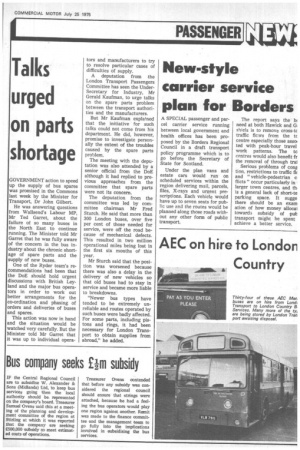Talks urged on pads shortage
Page 23

If you've noticed an error in this article please click here to report it so we can fix it.
GOVERNMENT action to speed up the supply of bus spares was promised in the Commons last week by the Minister for Transport, Dr John Gilbert.
He was answering questions from Wallsend's Labour MP, Mr Ted Garret, about the failure of so many buses in the North East to continue running. The Minister told Mr Garret that he was fully aware of the concern in the bus industry about the chronic shortage of spare parts and the supply of new buses.
One of the Ryder team's recommendations had been that the DoE should hold urgent discussions with British Leyland and the major bus operators in order to work out better arrangements for the co-ordination and phasing of orders and deliveries of buses and spares.
This action was now in hand and the situation would be watched very carefully. But the Minister told Mr Garret that it was up to individual opera tors and manufacturers to try to resolve particular cases of difficulties of supply.
A deputation from the London Transport Passengers Committee has seen the UnderSecretary for Industry, Mr Gerald Kaufman, to urge talks on the spare parts problem between the transport authorities and the manufacturers.
But Mr Kaufman explained that the initiative for such talks could not come from his department. He did, however, promise to investigate personally the extent of the troubles caused by the spare parts problem.
The meeting with the deputation was also attended by a senior official from the DoE although it had replied to previous approaches from the committee that spare parts were not its concern.
The deputation from the committee was led by committee chairman Mr Fred Sturch. He said that more than 300 London buses, over five per cent of those needed for service, were off the road because of mechanical defects. This resulted in two million operational miles being lost in the first six months of this year.
Mr Sturch said that the position was worsened because there was also a delay in the delivery of new vehicles so that old buses had to stay in service and became more liable to breakdowns.
"Newer bus types have tended to be extremely unreliable and routes operated by such buses were badly affected. For some parts, including pistons and rings, it had been necessary for London Transport to obtain supplies from abroad," he added.




































































































